Does the Ap Art Portfolio Have to Have a Theme
Last Updated on Feb 24, 2022
These are a selection of works and commentaries from Ratthamnoon Prakitpong, a graduate from Thai Chinese International School in Bangkok, Thailand. Ratthamnoon was i of sixteen students worldwide to receive a score of 100% for his AP Studio Art Drawing Portfolio in 2015, earning every betoken possible on each portion of his portfolio. His portfolio scored a perfect six.


AP Studio Art: Breadth
The Breadth section of the AP Studio Fine art portfolio is a cracking take a chance to brush up on skills and experiment. The Latitude section of the portfolio consists of 12 works of art that demonstrate a mastery of skills whilst showing the artistic range of a pupil. Here are some examples of what I did to make my work better and more personal:
The importance of a good limerick

For this class projection, we had to work on transparent textures. Having stiff painting skills is of import; having a potent composition to work from equally and so. The first batch of preliminary images I did were indoors with two wine glasses. I felt similar the dissimilarity and depth were sufficient, just my teacher, Elizabeth Jendek, asked me to try other kinds of glass to brand the composition more interesting. I took loads of photos to find compositions that worked. On the second and third preliminary compositions I presented to my teacher, the light was indoors and the glass didn't accept cogitating areas. The third composition was better because of the outdoor light, just it notwithstanding wasn't groovy.
Then my teacher suggested I photograph outside in sunset. Being outside made the still life await more natural and lively; these effects were emphasized by the striped textile, which increased movement. In improver, the dusk'southward orange light really heightened the spectacles' shine and contrast. With the table'due south directional line, I got the depth back from the first composition that was lost during the second and third tries. My composition was stiff because my focal point was to the side, which follows the rule of thirds: there were size relationships showing depth and perspective. There as well was variation by color and shape, making the limerick more stimulating. A strong composition illuminated my skill of painting. Although this is a drawing portfolio, a good limerick is as important as your great skill of painting in and of itself. To go the best compositions, I questioned myself; I didn't expect things to work out the very kickoff time, listened to my peers and teacher's advice, and kept working on it until I got the all-time composition.
Revisiting work makes a big divergence
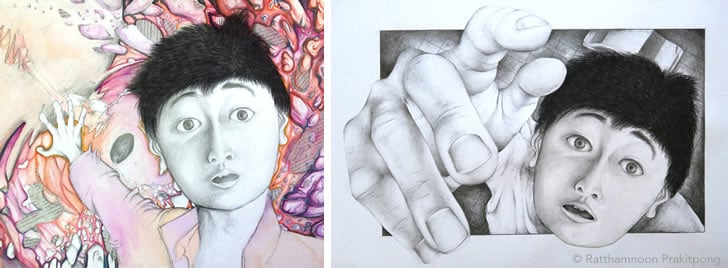
As my skills improved, I constitute that some of my piece of work looked a petty uneven. I had a portrait that I did earlier, which no longer matched the skill level of my other piece of work. Since the face was working fine, the teacher and I discussed the idea of cutting and pasting the head onto a new paradigm. I took a few photos and did a new composition in Photoshop and came upward with a new image. Once I was confident with my new idea, I sketched out my new composition on fresh paper, cut out the face and glued it to the new limerick. My new version was much better and information technology evened upward my skill level throughout the portfolio in my terminal submission.
I took calculated risks with fourth dimension and composition. I scheduled my time well and used all the skilful guidance and technology bachelor to finish this drawing. It turned out to be i of my favorites.
Sometimes abandoning a piece of work of art is better than to keep fighting it
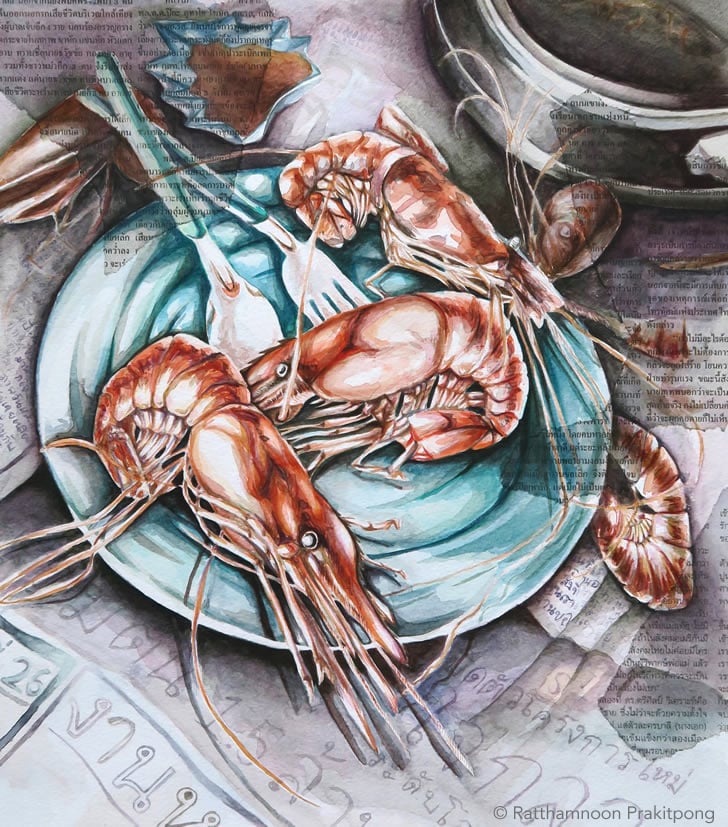
While I was doing my portfolio, I had a few compositions that needed reworking – one in particular really but wasn't working out. I tried adding more to the limerick; I did loads of preliminary sketches, and finally decided I was getting nowhere. After discussing and problem-solving with my instructor, nosotros decided it would be better to start a fresh new artwork based off an alternative lesson. Information technology'due south truthful that it was difficult to let go of so much piece of work already washed, and the new project was every bit challenging, but information technology worked much better than if I would've continued beating a dead horse.
To compensate for lost efforts, I tried to add my own personal touches to this fine art piece. Even though the green plate can be seen just as a dainty contrast to the orangish shrimp, it'due south also the same plate my family uses when we leave picnicking. We ordinarily lay erstwhile newspapers underneath our seafood and so that mess won't spill anywhere. I took direct inspiration from that, and glued newspaper onto my work for texture; to terminate, I copied Thai letters onto the composition. Past adding my own personal touch, this unproblematic projection became more unique, and much richer. They were my shrimp, and this is how I eat them.
Look for inspiration around you, in unlikely places

Friends and I went on a hiking trip to Phu Kradueng. In this area of Thailand, automated services aren't available, so local couriers offer their services by carrying huge loads to the height of the mountain expanse. Watching these men lift such enormous amounts was inspirational, and I took this great photograph capturing their strength and beauty – information technology reminded me of Greek Gods. Although this wasn't a class project, I painted it on my own anyhow for two reasons: the tourist sight was so unique, and it was besides an important memory for my friends and I. To further the personal nature of this prototype, I glued my train ticket to the composition to farther add to that feeling of a snap in time, fully enclosing the character of the place and to add additional texture.
AP Studio Art: Concentration
Concentration is a department where I focused on a specific topic and many art skills. It'due south very intense and pressuring. Hither I commented on a few skills that I focused on to make my Concentration more successful:
Picking the right Concentration topic is incredibly important
Since the Concentration department needed twelve pieces based on a single topic, my teacher advised the grade to look long and hard for a topic that had room for development and exploration, nevertheless remained accessible. It took me a few months, but I settled on a Concentration topic about unlike perspective-based portraits in the kitchen.
Thematically, I picked this topic because I was already a hobbyist melt, and wanted to combine and explore the 2 things that I liked – fine art and cooking. I feel, in my country, there's a cultural stigma near men in the kitchen that I wanted to both question and eradicate past demonstrating that men tin cook as well as anyone else.
I decided to pursue portraits and create variation using different perspectives and colour schemes. For my take on perspective, I used a selfie stick to find new perspective and angles. Where my hands were holding the camera, I superimposed kitchen tools – spoons, forks, spatulas – to hide the selfie stick in the drawing. As for the kitchen itself, I found inspiration from my personal exploration in using new kitchen tools, like cooking noodles for my lunch box or eggs in the morning. These were additional considerations I made when selecting this topic:
- My exploration was not just visual, but personal also. It showed my development as an artist and a thinker. I but had around five ideas at the beginning because I wasn't familiar with the kitchen, but as I personally explored the kitchen more, inspiration came naturally.
- I cared almost my topic. I was exploring my hobby and my culture. If I wasn't passionate about my topic, past the 8th or 9th epitome I would've hated my work. Artwork without passion is apparent.
- It was visually appealing. Fifty-fifty though my personal story and passion were at that place, my Concentration wouldn't exist as strong if I did not play with perspectives and color schemes. I was really experimental about it too, and when the compositions didn't work, they still served every bit a springboard for the side by side idea.
- My topic was versatile enough to have twelve different ideas united under it. The kitchen has interesting tools, objects and angles I could use to experiment. That kept my idea fresh, yet united.
- My topic was flexible. Choosing my kitchen as a basis for my topic might seem simple, but information technology provided enough room for experimenting with techniques that weren't necessarily kitchen-related, like superimposition or collage.
- My topic was accessible. I could go back easily to the kitchen and photo some more, or look for other inspirations. This made a huge deviation when some compositions needed more reworking than others.
(If yous are struggling to come up with your own AP Studio Fine art Concentration ideas, please read: Art Project Ideas: a guide to subject matter pick).
Hither are some examples of how I problem-solved composition concerns, increased depth, and manipulated my imagery.
I experimented with depth

I increased depth with my selfie stick; it gave me more options with regards to angles. The offset limerick in which I used the stick didn't quite capture what I wanted, and so I added an additional shelf at the pinnacle of my composition to increase depth. I used a fisheye lens to brand the composition more than interesting, and changed the easily that held the selfie stick altogether. I also manipulated colour from the originally bland white into a triad colour scheme to make it more visually dynamic.
Combining multiple skills enriches your fine art
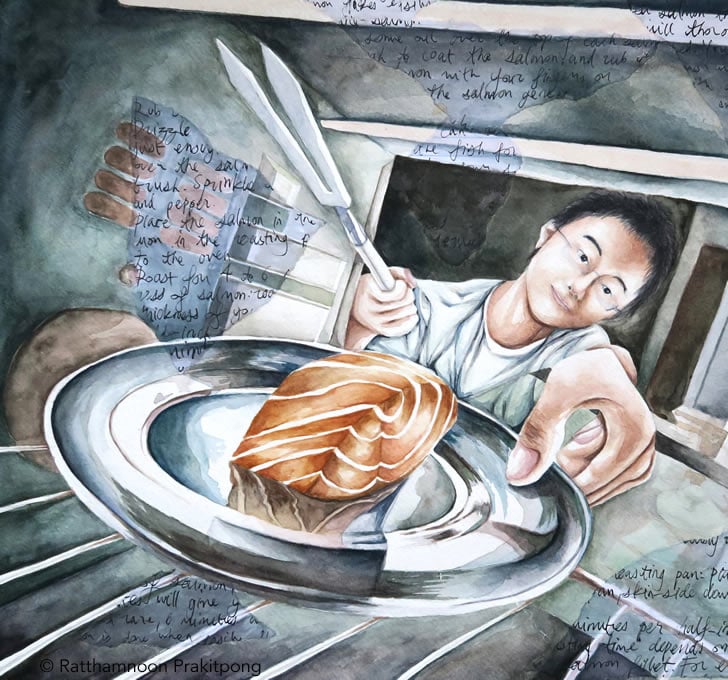
I had already used bird'southward middle and worm's eye of view, so I had to come up with something unique for this one. When I looked at the oven, I remembered when my mother baked and thought of her delighted face when she pulled out her blistering. So I decided to render some freshly baked food and the serenity on someone's confront when they commencement encounter the food. This gave my image more personal meaning. I also added pieces of a paw written recipe for texture and to increment motion. Additionally, I superimposed a meat fork where my selfie stick had been.
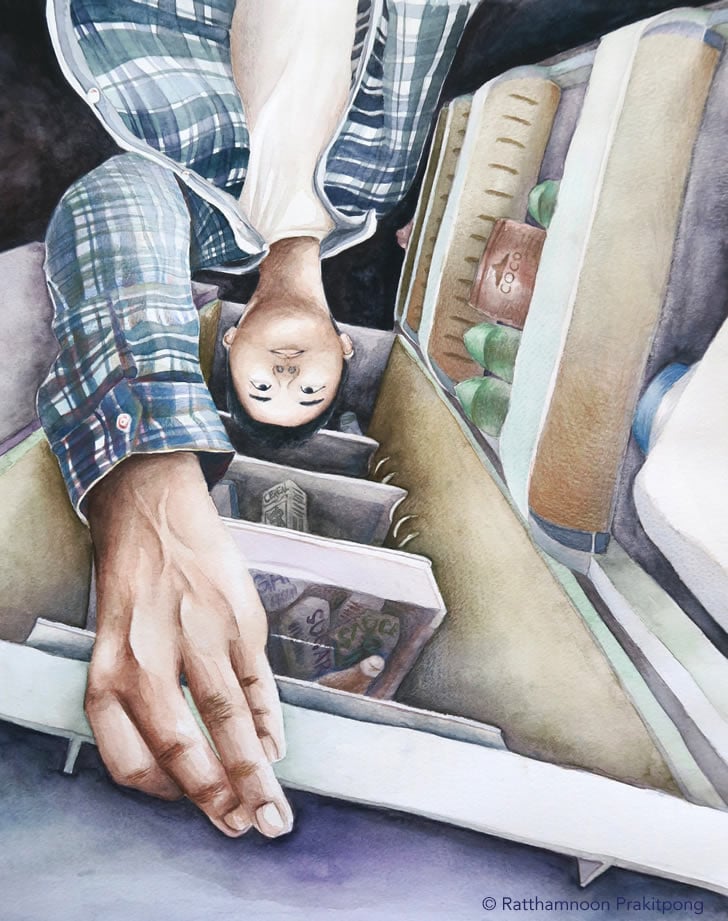
Last thoughts
In retrospect, I made many gutsy moves, and I failed – a lot. However, I succeeded a lot too. It actually came downwards to commitment, to exercise, to having many chances to fail and, in turn, to succeed. I made more 24 art pieces, but I got to cull the ones I was actually proud of for a trimmed version of my portfolio. Most importantly, I'm just another person, and what I did may not apply to y'all. Listen to the people who know you, who are close to you lot – your teacher, your peers, and yourself. There's no point in making anything unless you will be proud of it. That means sometimes an unyielding stance, or sometimes bullheaded organized religion in advice.

This AP Studio Art Cartoon course was taught past Elizabeth Jendek. Work from her students is used by Alison Youkilis, an AP Fine art instructor trainer, to teach other educators around the world. You tin can see additional outstanding artworks by Elizabeth Jendek'south students in the commodity: fifty+ Still life drawing ideas for fine art students.
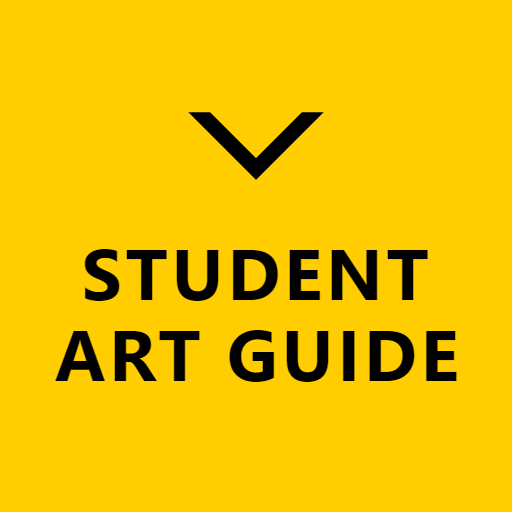
This high school art project was shared with our audience so that other students may benefit from the ideas, techniques and approaches used. We celebrate the attempt and achievement of loftier school students and Fine art Departments around the world. If you would like to share your own art projection (or that of your students), delight read our submission guidelines.
cawkerfacquirling.blogspot.com
Source: https://www.studentartguide.com/featured/ap-studio-art-drawing-portfolio-2
0 Response to "Does the Ap Art Portfolio Have to Have a Theme"
Post a Comment